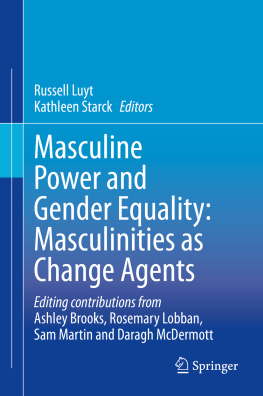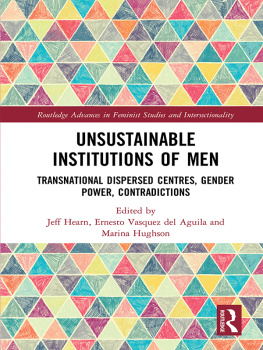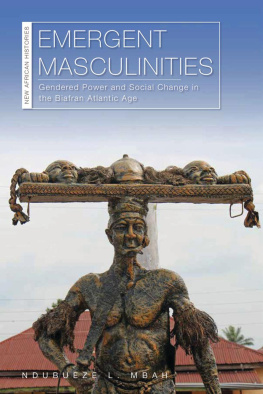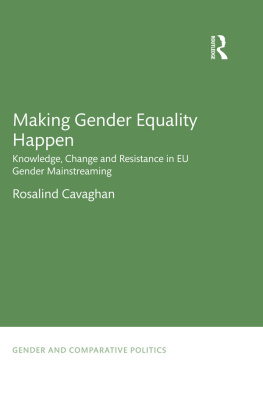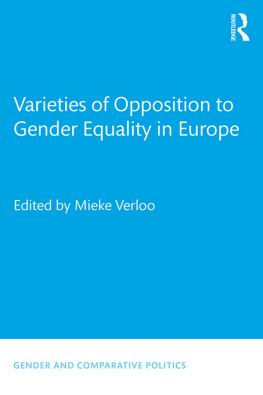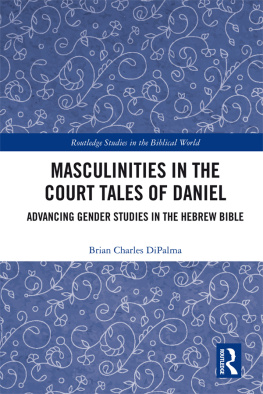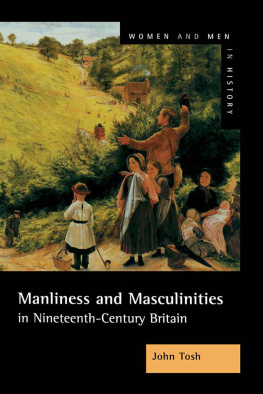Russell Luyt - Masculine Power and Gender Equality : Masculinities as Change Agents
Here you can read online Russell Luyt - Masculine Power and Gender Equality : Masculinities as Change Agents full text of the book (entire story) in english for free. Download pdf and epub, get meaning, cover and reviews about this ebook. year: 2020, publisher: Springer Nature, genre: Politics. Description of the work, (preface) as well as reviews are available. Best literature library LitArk.com created for fans of good reading and offers a wide selection of genres:
Romance novel
Science fiction
Adventure
Detective
Science
History
Home and family
Prose
Art
Politics
Computer
Non-fiction
Religion
Business
Children
Humor
Choose a favorite category and find really read worthwhile books. Enjoy immersion in the world of imagination, feel the emotions of the characters or learn something new for yourself, make an fascinating discovery.
- Book:Masculine Power and Gender Equality : Masculinities as Change Agents
- Author:
- Publisher:Springer Nature
- Genre:
- Year:2020
- Rating:5 / 5
- Favourites:Add to favourites
- Your mark:
- 100
- 1
- 2
- 3
- 4
- 5
Masculine Power and Gender Equality : Masculinities as Change Agents: summary, description and annotation
We offer to read an annotation, description, summary or preface (depends on what the author of the book "Masculine Power and Gender Equality : Masculinities as Change Agents" wrote himself). If you haven't found the necessary information about the book — write in the comments, we will try to find it.
Russell Luyt: author's other books
Who wrote Masculine Power and Gender Equality : Masculinities as Change Agents? Find out the surname, the name of the author of the book and a list of all author's works by series.
Masculine Power and Gender Equality : Masculinities as Change Agents — read online for free the complete book (whole text) full work
Below is the text of the book, divided by pages. System saving the place of the last page read, allows you to conveniently read the book "Masculine Power and Gender Equality : Masculinities as Change Agents" online for free, without having to search again every time where you left off. Put a bookmark, and you can go to the page where you finished reading at any time.
Font size:
Interval:
Bookmark:
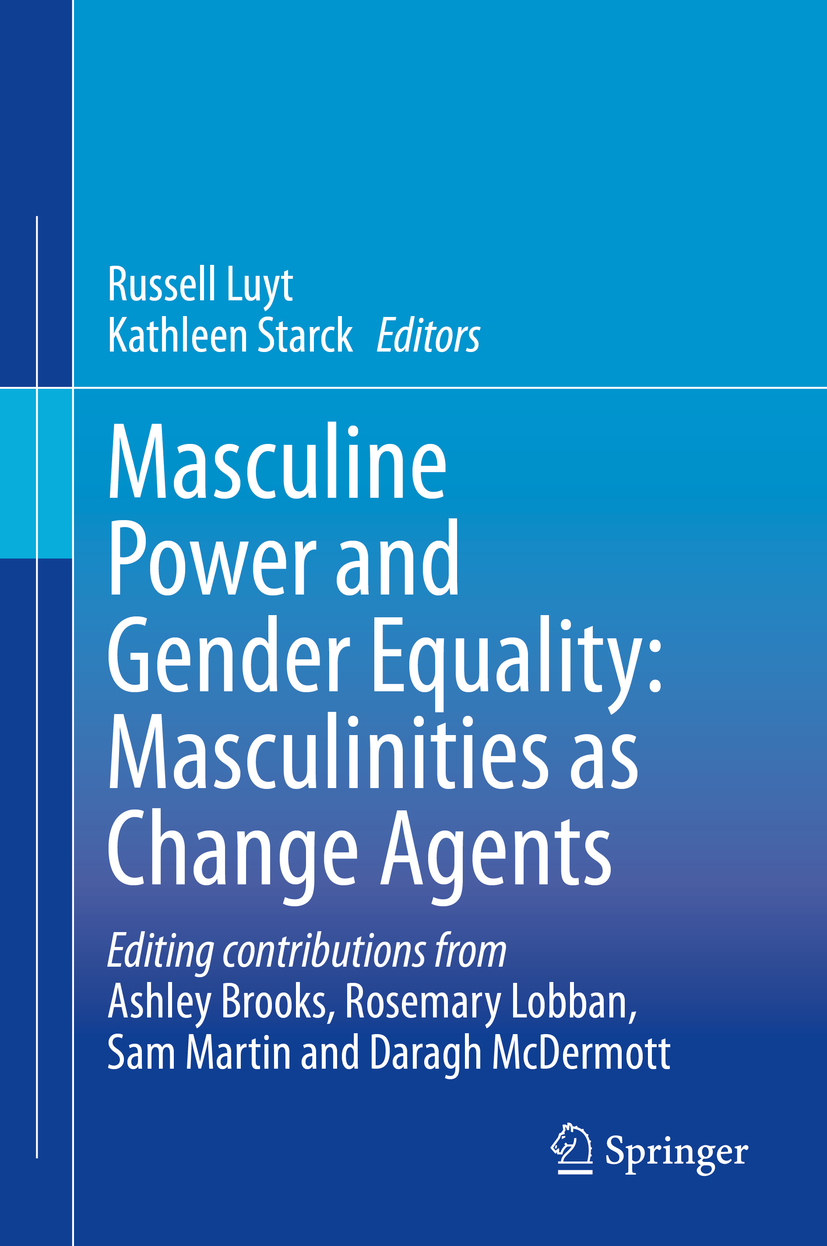

This Springer imprint is published by the registered company Springer Nature Switzerland AG
The registered company address is: Gewerbestrasse 11, 6330 Cham, Switzerland
Chapter1: Only for the Brave? Political Men and Masculinities: Change Agents for Gender Equality
Russell Luyt and Kathleen Starck
This chapter draws on recent debates concerning the concept of political masculinities and its application, including the contributors work to this volume, to critically consider its definition and use. In doing so, we identify and discuss areas of critique, including: a singular or multiple concepts of political masculinities, locating political masculinities within a conceptual landscape, and understanding power and political masculinities. We argue that the concept of political masculinities holds continued theoretical and applied value as demonstrated in its use in understanding men and masculinities contribution as, or in support of, change agents for gender equality. An associated literature highlights the specificities and potential pitfalls of political men and masculinities as agents of change. These are very different from the challenges that women face when engaging in the struggle for gender equality. And yet the benefit of mens involvement as, or in support of change agents for gender equality, is clear. The need for critical consideration of these pitfalls and mens self-reflection concerning their contribution toward progressive gender change is necessary. But accepting this, the need for mens pro-feminist engagement remains undiminished.
Chapter 2: The Politics of Absent Men or Political Masculinities without the Polis
Jeff Hearn
This chapter interrogates political masculinities as agents for change through the prism of absence, without the polis. Following an initial discussion of political masculinities in relation to, first, mainstream politics, and, then, feminism, possible changes in political masculinities formed through absence, and their implications for profeminist mens politics, are interrogated. Three main forms of absence are examined: absences by transnational/global processes, beyond the nation; technological absences, of virtuality and disembodiment in cyberspace; and bodily absences, as, for example, with ageing. These changes, and moreover their interconnections, are seen as creating new gender power structures, but also offering some signs of hope, with greater transnational connections, collaborations and indeed new subversive political masculinities.
Chapter 3: Male Agents of Change and Disassociating from the Problem in the Prevention of Violence against Women
Stephen R. Burrell
This chapter explores the complex and contradictory nature of political masculinities within efforts to engage men and boys in the prevention of mens violence against women. It discusses findings from 14 expert-informant interviews with activists who have played an influential role in developing this work in the UK context. These interviews drew attention to how, for male agents of pro-feminist change, political masculinities are also profoundly personal. Transformations in the self are thus as important as bringing about change in others in this work otherwise men risk reproducing the same patriarchal inequalities that they seek to dismantle. One significant barrier to critical self-reflection for men involved in preventing violence against women is that of disassociation; a perception and construction of oneself as being separate from the problem in relation to other men, mens violence itself, and patriarchal relations. Resisting disassociation is therefore vital in order for pro-feminist men to recognise how they continue to be implicated the perpetuation of violence against women. This requires male agents of change to move beyond a sense of shame about their position within patriarchy and to understand how they engage in political masculinities as they work to prevent mens violence against women.
Chapter 4: Change among the Change Agents? Mens Experiences of Engaging in Anti-Violence Advocacy as White Ribbon Australia Ambassadors
Kenton Bell and Michael Flood
How does mens participation in the social movement to prevent violence against women change their relationships with other men and with women? How does it affect their understanding and practices of masculinity? This chapter offers a case study of White Ribbon Australias Ambassador Program, which involves men as public anti-violence advocates, inviting them to stand up, speak out and act to influence other mens attitudes and behaviours towards women. Drawing on an online survey (n = 296), complemented by in-depth interviews (n = 86), this research examines mens perceptions of the meaning and significance of their involvement as advocates for the prevention of violence against women and how to improve advocacy outcomes to end mens violence against women. These male advocates report that they have changed how they relate to other men, to a lesser extent how they relate to women, and that they have greater commitments to promoting gender equality and to reflecting on their roles as men. Moreover, they report that because of their involvement they are engaged as active bystanders and agents of change. The findings of this research could have practical implications for the efforts to improve the engagement of men as agents of change.
Chapter 5: Men in Finance for Emancipatory Social Change?
Font size:
Interval:
Bookmark:
Similar books «Masculine Power and Gender Equality : Masculinities as Change Agents»
Look at similar books to Masculine Power and Gender Equality : Masculinities as Change Agents. We have selected literature similar in name and meaning in the hope of providing readers with more options to find new, interesting, not yet read works.
Discussion, reviews of the book Masculine Power and Gender Equality : Masculinities as Change Agents and just readers' own opinions. Leave your comments, write what you think about the work, its meaning or the main characters. Specify what exactly you liked and what you didn't like, and why you think so.

